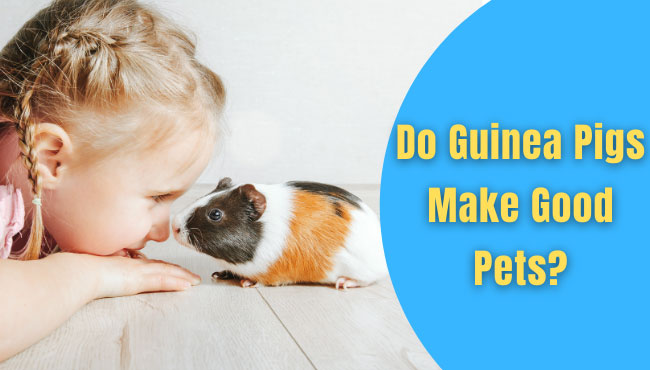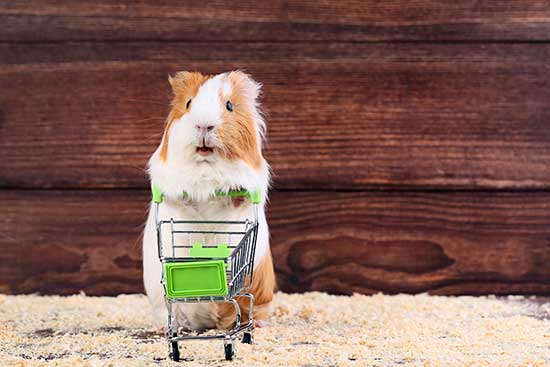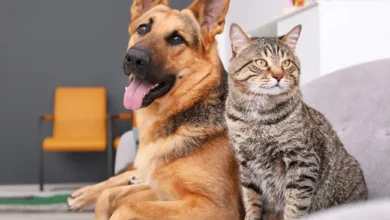
It’s human nature to seek companionship with other beings. After all, humans are naturally social and want to share a genuine relationship with someone, be it a person or even a pet animal. Among the common pets that most families own are dogs, cats, fishes, birds, and, yes, you guessed it, guinea pigs. If you are thinking of getting one, it pays to know more information on how to handle and care for them.

Read More:
- Best Dog Food That’s Delicious & Healthy
- The Ultimate Guide to Train Your Dog to Get Along with Your Bird
- 6 Pets You Can Keep in Your College Dorm
- How to Make Your Bird Happy: Useful Pieces Of Advice
- These 5 Tips Will Keep Your Dog’s Coat Healthy
These furry and adorable small friends are gentle, fragile, and fun to care for as household pets. They’re friendly with people and are safe even for small children. However, although they can be as gentle and soft as possible, they require much love and care from owners. Owning a pet is similar to caring for a baby in the family, so you need to prepare before welcoming your new member.
Here are some essential things to be aware of before getting a guinea pig:
#1. Guinea Pigs Are Social Animals
One of the most important things to note about guinea pigs is their characteristic of being social butterflies. The social nature of guinea pigs is one of the reasons they are one of the happiest living beings. They love having company around whom they can eat together or play around with. It would be preferable to have a similar gender as pairs, so they don’t have to breed if it’s not part of your plan. Also, they can live harmoniously, sharing similar habits and preferences since they share the same gender. Like humans, there will be changes when their personalities don’t jive and conform with each other, so it’s best to introduce them when they’re still babies or young.
A pair or small group of guinea pigs is ideal since they usually live in groups of five to ten in the wild. When they’re paired or combined well, this allows a good environment for them, so they remain healthy and happy. Aside from socializing with their fellows, they also enable humans to interact with them. Therefore, make time to care for and play with them so they’ll be more at ease with you.

#2. Feed Them With Greens
Grass or hay is always required for guinea pigs. These are essentially healthy foods that you should keep in mind. You can go for natural greens such as leafy vegetables like lettuce or kale. The nutrients in these greens will sustain them to be healthier. If you feed them the correct diet, your guinea’s teeth will remain the correct length and shape. Additionally, they can also have an excellent digestive system which prolongs their life.
Lawnmower clippings are not good food for your pet, so try to avoid feeding them those. When feeding either fruits or veggies, make sure to care for their portions, as overfeeding them will upset their stomachs. You can also find some high-quality guinea pig pellets to supplement their healthy green diet. Additionally, ensure they’re getting enough vitamin C. Whatever food you’re feeding your furry friend, make sure it improves their physique.
#3. Be Careful In Getting Other Pets
Several animals naturally prey on Guinea pigs. Therefore, you must consider their nature when adding another pet to the house. It would be best to care for them alone, so they can live comfortably without feeling anxious about other animals’ presence. Guinea pigs have demonstrated that they can communicate their emotions, so there could be a chance that they would feel jealous if they see you caring for other pets.
#4. It Is Best To Seek A Vet’s Advice Before Getting A Guinea Pig
The earliest possible time should be set aside to register with a veterinarian and while you’re at it, seek advice on how to care for them properly. A veterinarian offers advice, performs health checks, and performs vaccinations and injections if necessary. You can rest easy knowing your pet is in good hands. Consider preparing the questions for your vet to ensure that your guinea pig is cared for very well.
A guinea pig who isn’t registered with one might have a more challenging time getting the help they need, which will also be more expensive. Find a trustworthy local vet near you who is accessible so you can easily visit with your guinea pig anytime. Consult with other guinea pig owners in your area or choose a vet based on reviews or recommendations.
#5. Caring For Guinea Pigs Require Time
Another aspect you should have when having a guinea pig pet is time. This is a significant factor. They must be able to be taken out of their cage once in a while. In addition to daily interaction and attention, guinea pigs also need time to stretch their legs and explore new environments. They can play with you indoors, or you can take them to a nearby park while you constantly stick by their side.
Another thing that requires time is their grooming. Depending on their breeds, they would need care for their hair and fingernails. Guinea pig cages need to be cleaned thoroughly once a week and spot cleaned regularly. Whatever care activity you have in mind, make sure you can afford some time before bringing a guinea pig home.
#6. They Are Always Active
Guinea pigs enjoy napping. However, they are usually more active than lazy. Because of this, they require lots of room to move around. Perhaps it’s one reason why having a treadmill in their cage is beneficial. They can play and run around it for a long time every day so that they can be preoccupied. When setting up their home, keep in mind to add some other toys and tools that they can be busy with.
#7. They Prefer A Large Cage
A guinea pig cage should be one of the things you need to shop for carefully. Consider the number of pets you’re getting and their body size. It also helps to anticipate how much they’ll grow in the coming months so you can find the best-sized cage for them.
It takes a lot of space to house guinea pigs. Add enough bedding and allot an area for feeding and drinking. While you can find different types of cages, you can also create a DIY pet cage for them to ensure all their needs are met.
#8. Clean Their Beddings Regularly
Another essential task to never forget is to check and clean their bedding regularly. This is because guinea pigs are often infested with parasites. You can get rid of their litter and dirt every day and schedule a deep cleaning of their bedding at least once a week.
As bedding material, grass hay is recommended, as they are soft on the feet and delicious for the animals to eat all day. Try to keep them fresh and replace them when necessary, as hays usually invite bacteria and pests. When bedding isn’t cleaned or replaced, this could endanger the health and hygiene of your furry friends. In other words, when it comes to washing their bedding, you shouldn’t take any chances. No matter how busy your day can be, make time to replace and sanitize your bedding.
#9. You Can Get Your Pet Insured
You should also make sure you get adequate insurance for your guinea pig. Nowadays, it’s always practical to get pet insurance. This protects your pet and allows you to enjoy financial savings whenever unanticipated circumstances occur.
Pet healthcare costs can be challenging to pay without insurance. Therefore, pet owners are recommended to have it. You can choose an insurance policy that can cover the death, theft, and loss of your pet. Find the best option for pet insurance for you and your pet to feel protected.
#10. Let Guinea Pigs Learn And Explore
Guinea pigs have a high level of intelligence, so it’s vital to give them opportunities to continue learning and exploring. Whether your guinea pigs live, they will not get bored when you give them toys and other stuff to study, play with, and research.
They’re always curious, so you can add different things that they can discover every week. However, when choosing toys, ensure that you don’t go for plastics as they can be swallowed and endanger your pet.
#11. You Have To Monitor Them When They’re Out Of The Cage
All pets, including guinea pigs, need to spend some time outside. Anytime you have time to spare, it’s best to get them out of their cage so they can stretch their legs and have a change of environment. However, every time you do this, ensure that you monitor them well. You probably can’t tell, but there are a lot of dangerous variables that could possibly hurt them, like other animals, insects, sharp edges, or rough surfaces.
No matter how excited they are to go out of the cage, always look after them. They’re gentle and soft, so they can easily get hurt. If you can’t constantly keep an eye on them while they’re out of the cage, it’s best to ask someone else to do it for you.
Conclusion
Following specific guidelines is essential to keeping and caring for guinea pigs. Hopefully, all the details and information above have helped you know about their proper care and handling. Animals are highly sensitive to their environments. Keep your guinea pig’s cage clean to ensure its health. They also need time, devotion, love, exceptional care, and attention. Lastly, try to register them with a vet and get insurance when viable.
References
https://www.britannica.com/animal/guinea-pig
https://www.rspca.org.uk/adviceandwelfare/pets/rodents/guineapigs



